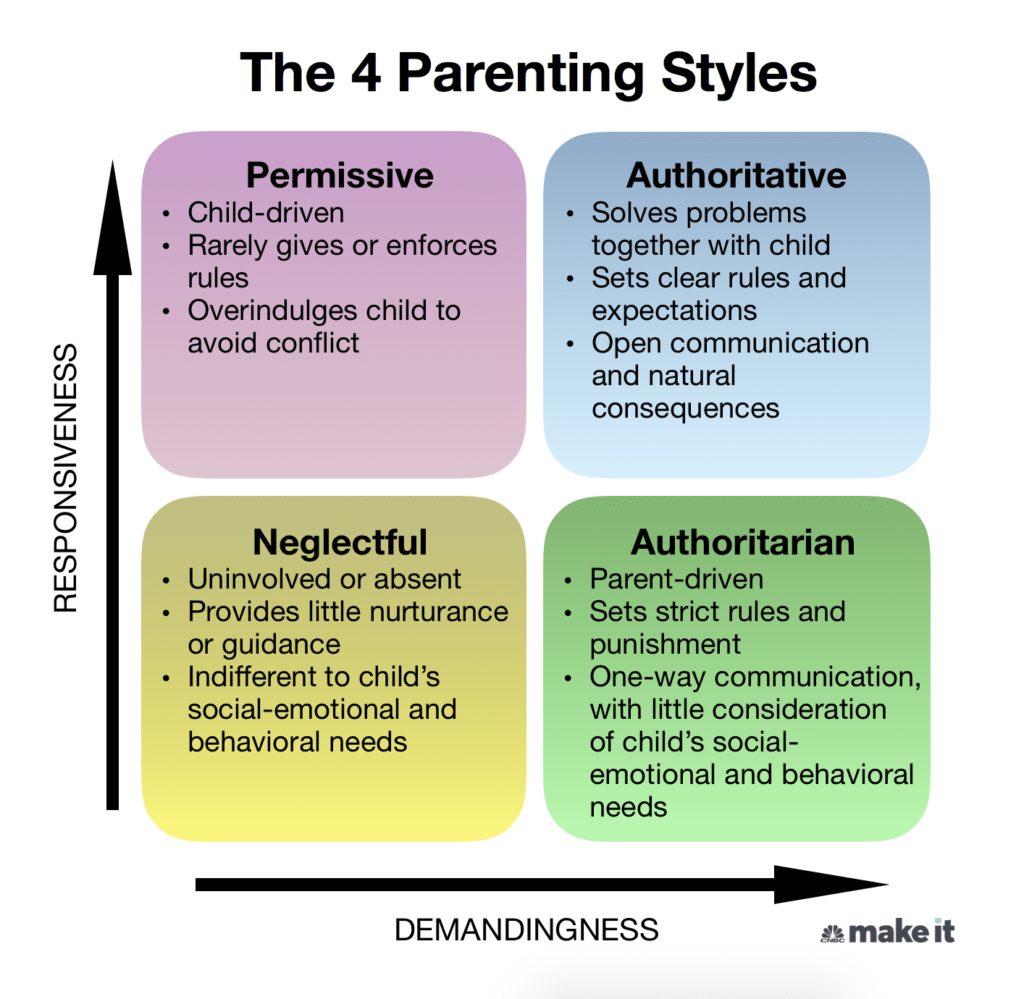If you’re a regular listener of our podcast, “The Brainy Moms,’ you’ve probably heard our expert guests (and hosts!) discuss a number of different parenting styles. Although some experts argue that there are as many as 12 different types of parenting styles and child discipline strategies, the four main parenting styles used in psychology are generally agreed to be permissive, neglectful, authoritative, and authoritarian.
As you read through these, consider that you may find yourself straddling between parenting styles to draw from elements that create the best results based on the needs, interests, values, and personalities of your family members. The goal isn’t perfection but rather creating a life that’s filled with joy, connection, health, mental wellness, and safety. As our podcast guest, Dr. Hansa Bhargava, pediatrician and author of Building Happier Kids: Stress-Busting Tools for Parents points out, “There has to be a shift away from thinking perfection is the ideal. Perfection is not the ideal. Happiness and healthiness is the ideal.”

This is a helpful graphic for understanding how the 4 core parenting styles fall on scales of responsiveness and demands. This framework was originally published by researchers in the 1960s-1980s.
Maccoby E. Martin J. Socialization in the context of the family: Parent-child interaction. In: Mussen PH, editor. Handbook of Child Psychology. Wiley; New York: 1983. pp. 1–101.
1. Authoritarian Parenting
Characterized by a value of obedience to higher authority as a virtue, authoritarian parents often believe that it’s their job to “bend the will” of strong-willed children, who they may perceive as being self-indulgent. Some authoritarian parents also allow for teachers, other relatives, or even authorities in their church to address what they perceive as bad behavior. This style is often marked by high levels of parenting control but low levels of parental responsiveness. This strict style of parenting is typically focused on obedience without question (think “because I said so!”) for behavioral and psychological control, and sometimes uses harsh punishment or even corporal punishment for control. Children of authoritarian parents are more likely than those of authoritative parents (see below) to struggle with low self-esteem, mental health issues, poor academic performance, behavioral or conduct issues, and fewer coping skills.
2. Authoritative Parenting
Although similar in name to authoritarian parenting, authoritative parenting is very different. While parents may expect their children to act maturely and strive for achievement, they tend to be less restrictive and more receptive to their children’s autonomy. While these parents may still set rules and enforce them, they are generally more open to discussions and feedback from their children. With discipline learning toward supportive rather than punitive, children often thrive by being given freedom, independence, and unconditional love. Rather than making demands or threats, this parenting style focuses on using opportunities to teach values and morals. Of the four core parenting styles, most psychologists believe authoritative parenting produces the happiest and most well-adjusted children.
3. Neglectful Parenting
As it sounds, neglectful parents tend to be indifferent to their child’s needs, often due to their own mental health issues, addictions, or childhood/spousal abuse. These parents not only fail to set standards or boundaries for their children, but also position the child for problems down the road. These can include an inability to self-regulate their emotions, poor school performance, mental health issues, delinquent behaviors, and addiction.
4. Permissive Parenting
On the opposite end of the spectrum from authoritarian parenting, permissive parenting is marked by the parents’ high responsiveness with low demands. With few rules and boundaries, children raised by permissive parents are often allowed to behave in ways that others may describe as “indulgent” with little or no consequences from parental enforcement. With such leniency, these children often fail to develop emotional regulation skills, such as self-soothing or an ability to adjust their expectations. In terms of outcomes, children of permissive parents tend to fare worse than both authoritative AND authoritarian parents. Common problems that develop with lenient (albeit loving) parents include an inability to follow rules, lack of self-control, egocentric tendencies, aggression, and difficulties in relationships and social interactions.
This list is not comprehensive by any means. Every family chooses a dynamic that varies between these (and other) categories. While your own style of parenting may not fall entirely under one of these four umbrella approaches, you’ll probably recognize the main components of your style in one of them. To learn more about other sub-categories of parenting styles, tune into our podcast, The Brainy Moms.
